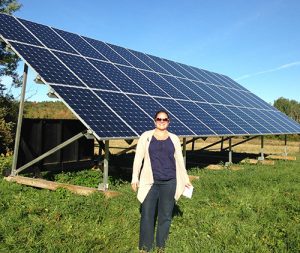 The talk will be held virtually via Zoom and in-person at 107 Norman Smith Hall, UMaine.
The talk will be held virtually via Zoom and in-person at 107 Norman Smith Hall, UMaine.
- Virtual attendance: Complete the registration form to receive Zoom connection information.
- In-person attendance: Masks are required for all Mitchell Center talks.
Speaker: Sharon Klein, Associate Professor, School of Economics
Maine communities have been taking local action on sustainable energy adoption and climate change adaptation for decades. However, there has not been a coordinated effort at the state level to directly support these projects until recently. Meanwhile, statewide Local Energy & climate Action Networks (LEANs) like the Vermont Energy & Climate Action Network and New Hampshire Local Energy Solutions provide regular peer-learning opportunities, trainings, centrally distributed information about funding, and other resources specific to community-scale projects to help community-scale projects be successful and learn from each other. With statewide partnerships (Governor’s Office of Policy Innovation and the Future’s Community Resilience Partnership, UMaine’s Climate Change Adaptation Providers Network, Maine Climate Action Now!, Maine Sierra Club’s Climate & Community Action Teams) and local regional groups (A Climate To Thrive, Bangor Area Comprehensive Transportation System, Center for an Ecology-Based Economy) now active, Maine has the necessary pieces to form a LEAN. What will it take to pull it together? How can a Maine LEAN advance equitable sustainable energy adoption and climate resilience in the state? What types of research opportunities could it provide for researchers? This talk will provide a vision for a Maine LEAN and the research possibilities related to it, as well as an overview of existing LEANs in other states. The talk will conclude with a discussion with audience members about these ideas.
Dr. Sharon Klein is an Associate Professor in the School of Economics and a Faculty Fellow of the Mitchell Center for Sustainability Solutions at the University of Maine. She has a Bachelor of Science in Environmental Science from the University of Massachusetts, Amherst, and a Ph.D. in Engineering and Public Policy from Carnegie Mellon University. Prior to her career in higher education, Dr. Klein worked as a high school environmental systems teacher in Quito, Ecuador and a middle school science teacher and environmental technician in San Diego, California. She also served as an Americorps National Civilian Community Corps volunteer in the Southeast region of the US. Dr. Klein’s research and teaching are multi-disciplinary in nature, centering on the physical, economic, environmental, and social/cultural tradeoffs inherent in sustainable energy decision-making. She is interested in all sustainable energy options but especially residential and community-driven solar energy and energy efficiency and those options that advance energy equity and justice. She is committed to community-engaged and service-learning research and teaching methods. Dr. Klein is a 2019 recipient of Maine Campus Compact’s Donald Harward Faculty Award for Service-Learning Excellence and 2022 Mitchell Center Award for Outstanding Mentorship of a Student in Sustainability Research. Dr. Klein is a Board member of the non-profit organization WindowDressers and Service Provider for the Maine Community Resilience Partnership.

